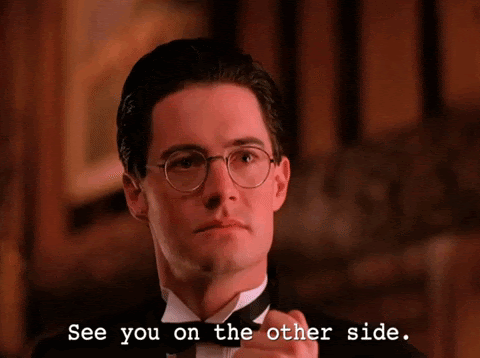Kurt: It’s 2022! Whatever that means! We hope y’all had a comfy and cozy and safe holiday season. To start off the new year, we thought we’d get back on our bullshit and share our thoughts on a recent New York Times piece that’s been making the rounds on social media, Marriage Requires Amnesia, by Heather Havrilesky. Read on for ghostly hook-ups, seven-year itches, roommate aesthetics, and how to stay sane when your partner does that one infuriating thing. You know what we’re talking about. That thing.
Ursula: We’ve linked to the original piece, but here’s a quick recap: Havrilesky describes a family vacation to Australia, using this context to paint a picture of her 15-year marriage. She loves her husband, but he is annoying, and she hates him. She posits that other long-married couples will know exactly what she’s talking about. “Marriage requires amnesia,” so the title goes, because without blurring the edges of your partner, you’ll grow to resent their quirks and their failures to the point where you can’t remember why you ever loved them. But, she reminds us, her husband is also hot and smart and kind, and there are times when she can see those things, too.
First off, just to be fair, I don’t think the essay is TOTAL garbage. I used to read Ask Polly faithfully and I like Havrilesky’s work; she has an acidity and a bluntness in her work (both obvious in this piece) that I appreciate. And yet! Is Heather okay? More importantly, are the rest of us married mortals okay?
Kurt: I do hope she is! Because really none of us are. And holy moley, that trip sounds like an absolute nightmare. At its core, the article is an exploration of what it’s like to be in a long-term marriage, and the ramifications—good and bad—that come with it. I liked her wit and style and her appreciation of hyperbole. But I couldn’t relate to her core concept that after a certain number of years, you’ll grow to hate your spouse. It honestly doesn’t make sense to me. But maybe that’s because I’m present-day-Kurt, and future-Kurt is looking back on this all smug and whispering you fool you absolute rube…
Ursula: You and I haven’t been married as long as she has, so perhaps we are the moony-eyed snobs she mentions in this essay who proclaim that we could NEVER hate our spouses. Then again, maybe if I had children with a man who, judging just from this reading, is a little self-absorbed and takes his family on what turns out to be a difficult international vacation but does little to help make the best of it, I would hate him, too. Doesn’t it seem like that’s the real problem here—an outside-the-norm situation that can really amplify a person’s worst qualities?
Kurt: I think those situations are a good gauge of how couples deal with stress together. Of the times Gil and I have been in those kinds of stressful situations, rarely do I feel the way she does in this article. And, yes, I realize a lot of it is irreverent, but the core remains the same. As I've probably mentioned before, a lot of my issues stem from withholding. When I decided to work against that toxicity, and be more open and honest with Gil, it was a bit of a revelation. And the times when I do get mad or frustrated, sometimes it’s just good to let things go. Which is easier in theory than practice.
Then again, if I was on vacation to Bird Shit Island, I’d probably be infuriated too!
Ursula: It’s true that marriage requires the ability to forget and forgive; to pick your battles; to take the good along with the bad. And that’s hard to do, sometimes. Marriage IS hard, as we’ve all heard a million times. But it should be the right kind of hard, a worthwhile and gratifying challenge, like running a race or painting a house. If your marriage is hard the way that a bout of food poisoning is hard, please reconsider.
Kurt: Everyone’s partners have quirks and mannerisms that irk them from time to time, and vice versa. It’s the nature of living with someone day after day. But this article seems to make a case for those things to be all-consuming. If I focused on all the little things that might bother me in our relationship, I’d drive myself mad. And maybe we are still too early in our relationships like she said, and we just haven’t settled into our hatred of our spouses. But that begs the question: do all couples feel this way?
Hate is a human emotion, and we all experience it from time to time. But to constantly feel hatred for someone? Especially if that person is your spouse? For me, to hold on to that kind of hatred is unimaginable. I’ve known people who have lived their lives with hatred in their hearts, and that is not the way to live, my dear readers.
Ursula: And we should specify here that neither Havrilesky’s essay, nor our response to it, is about truly BAD marriages. Like, if you’re actually miserable, or being mistreated, in your marriage, that’s both a bigger and entirely separate issue. What we’re grappling with here is the inevitable irritation that comes with knowing someone so well for so long, and where to put those feelings and what to do with them.
Kurt: So is this where the “seven-year itch” comes from? The idea that once a marriage hits seven years, it’s time to feel trapped in the relationship that used to bring you joy?
Ursula: I think it is! JD and I celebrated seven years of marriage just a few months ago, so stay tuned for a future issue of Matrimonium in which I announce our incredibly toxic, mutually destructive divorce.
Kurt: Or maybe JD will go on a ridiculous romp where he seriously considers cheating on you with Marilyn Monroe but ultimately decides against it when he remembers how much he loves his family. Yes, that’s a spoiler for a movie that came out in 1955.
Ursula: If JD can bag the ghost of Marilyn Monroe, I support it.
Kurt: I’m sure this wasn’t intentional in the article, but it reminded me of when we talked about gender roles in relationships, and how the kind of inherent “happy wife, happy life/ hot wife, dumb husband” mindset so prevalent in pop culture can be really damaging to marriages.
Ursula: Yeah, there’s something very 90s about this piece. It’s got a “MEN: can’t live with ’em, can’t live without ’em!” vibe that I was already tired of by the time I hit puberty.
On that note, let’s talk about the audacity of writing a piece like this and then allowing it to be published in one of the biggest newspapers on earth. I don’t know Havrilesky’s husband, but even if he does have some pretty big faults as a human, it doesn’t seem like he deserves this kind of treatment.
Kurt: I’m trying to imagine a scenario where we do the same thing to our spouses. Even if it were for comedic purposes, I’d have to take a step back and really consider how it would read to outsiders. For instance I’d have some real reservations about calling Gil “a tangled hill of dirty laundry” in the mornings, or describing him as a “lonely nerd” when he talks about his passions. To me, it doesn’t feel playful, it just comes across as mean-spirited. Besides, Gil is like a sweet baby bear in the mornings, so I guess I’m lucky.
Ursula: Right, like, I wrote mean things about my ex-boyfriends when I was in my early twenties, but again, those were EXES and I was writing on a blog with no audience. I could NEVER do JD this dirty—and if I were trying to be witty about the things I find annoying about him, I think I could do a better job of that, too.
I will say that there are parts of the final paragraph, when Havrilesky is able to take a moment away from her stress and irritation and remember why she fell in love with her husband in the first place, that resonate well with me. I have those moments, too, where I step back from the everyday machinations of life with the person I’ve chosen as my partner, and go, look at this guy. Isn’t he the best? Aren’t we lucky? That’s really nice, and it should be celebrated!
Because even in the happiest of marriages, we all get into slumps. JD and I have been in a bit of a slump the last few months. It’s nothing terrible, it’s just that most of our conversations have been about bills and groceries and we spend more of our free time alone, absorbed in separate hobbies, than together. We’re essentially roommates right now. It’s partly a winter thing, partly a pandemic blues thing, partly just a natural phase; we’ve been here before, it’s temporary, and it also won’t be our last.
Kurt: In the sage words of our patron saint Liz Lemon, “Yes to love, yes to life, yes to staying in more!” There is something to be said about feeling settled in a relationship. Yes, we all love the honeymoon period, but the relationship Gil and I have now is even better. There’s an ease to being together that I’ve rarely experienced with other partners. And I’ve been in relationships where I have felt like a glorified roommate, and believe me, it’s not great! I’m sure most couples go through slump periods, but the key thing is to not stay in the slump. After a time, you’ve got to want to break out of that rut.
And I do truly enjoy the last paragraph, too. There’s just something about how I feel when I look at Gil that always sends my heart a-flutter. He’s just nice to look at in general! And maybe our feelings for each other have morphed over the years, but the essence of that love remains. He is the best! We are lucky!
Ursula: It seems like we’ve talked ourselves out of panicking too much, but I’m a Virgo and I will not be swayed so easily. Maybe we’re taking this essay too literally (I know it’s supposed to be funny—I know), or maybe you and I are overly bristling at its core thesis. Maybe other, older couples read this essay and nodded sagely at Havrilesky’s words, and we’re over here staring down the barrel of marital misery. Are we so naive?? Readers who have been married for “more than seven years” (seems arbitrary!), can you weigh in here? Put our blessed minds at ease.












